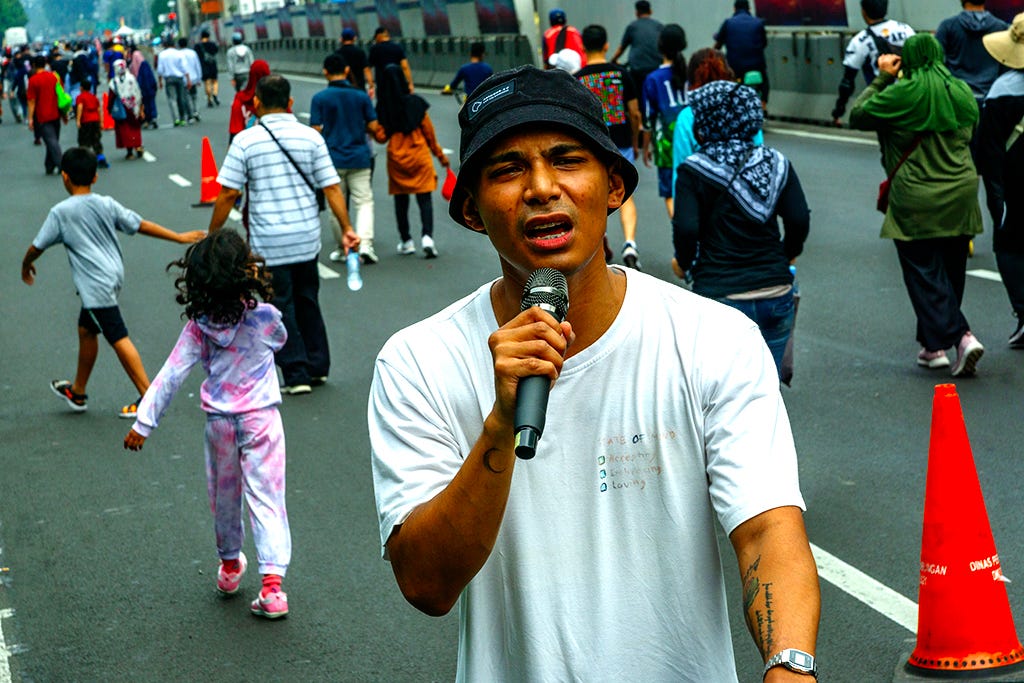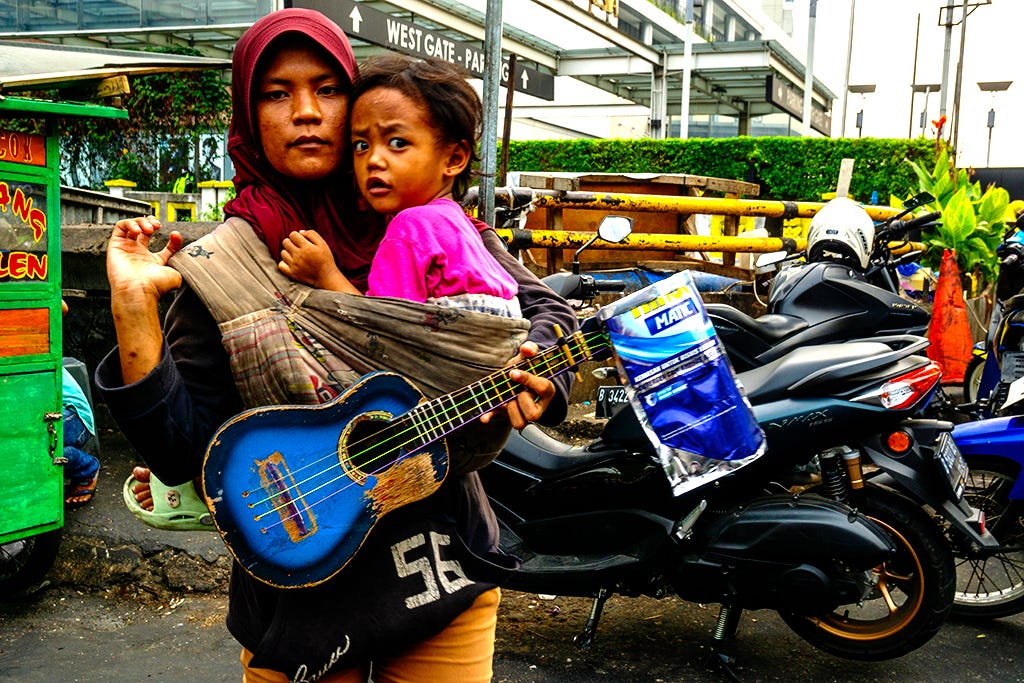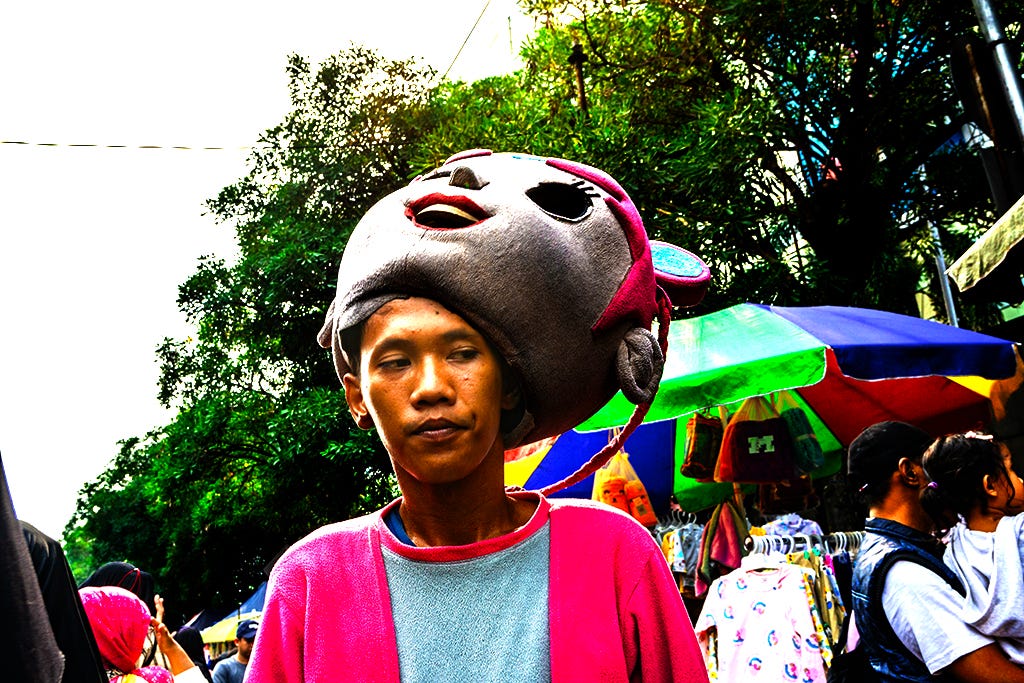[Jakarta, 12/24/23]
Some say I’m so hateful and insane, I hear voices. Today, I must come clean. At my $13 a night room at Oyo 101 Apple Platinum, sounds so fancy, I do hear a small, tinny voice inside my bathroom, and it always utters just one word, “Hello.” At first, I thought it was coming from the hallway or the next room, but then I’d hear it at 3AM, noon or around midnight, and it’s always this same, timid greeting reaching me from hell, heaven or outer space.
Maybe it’s some quirk of the plumbing or air vent, but having slept in hundreds of rooms everywhere, I’ve never heard any faceless voice so clearly, though distant. Facing the bathroom mirror in the middle of the night near the end of my life, I almost expected to see some sad being behind me.
“I’ve greeted you so many times,” he or she would say. “Why are you so heartless?”
“Yo, those are my lines! You’re stealing my shtick!”
The French believed Vietnamese were so fearful of ghosts, they wouldn’t fight at night, so could be easily smashed. We know how that turned out.
I have just days left in Jakarta. Again, I’m sitting outside Filosofi Kopi. Across the street are the Starbucks and Burger King where bombs went off just outside in 2016. Four days ago, I found a Yuval Noah Harari book here. After posing with it, I told a barista, “He’s not just a bad writer, but an evil person!” “I’m sorry!” she replied. A lovely person, she had on an “AMERICAN ICON” hoodie over her hijab.
If you’re a tattooed, nose ringed and labia pierced goddess suddenly abashed about your neon pink hair, there are cheap shawls available from vending machines inside subway stations. If you’re a hairy palmed incel coming out as a fake woman, you’re welcome to buy one, too, but don’t expect Indonesians to let you into their ladies’ rooms. Unlike many Christians, Muslims still have common sense.
Despite this, and their revulsion towards the bellicose West, many Muslims are still enamored of American culture, however. It’s still so sexy. American English is often seen on clothing, “GIME GIME GIME,” “What’s going on?!” “OK MONDAY LET’S GET THIS OVER WITH,” “SO WHAT IF THIS LIFE ISN’T PERFECT?”
At Farm Girl, an uppity eatery with Western options, workers wear cute or joky English on their back, “I want someone to look at me the way I look at coffee” or “It’s so tough living the life of an egg. You only get laid once,” etc. Though they speak enough English to serve foreigners, it’s unlikely they understand what they’re wearing. The jokes, then, are between Farm Girl’s owner and customers. The higher you are on the social scale here, the more English you’re likely to have, and the more Americanized your lifestyle.
To be American is to be uprooted and socially distanced from everybody, with no neighbors, friends or even extended family to barge into your life unexpectedly. To mingle a bit, there are neutral social spaces far from your isolated home, with its front and back yards, and “NO TRESPASSING,” “BEWARE OF DOGS” and “DUE TO PRICE INCREASE ON AMMO, DO NOT EXPECT A WARNING SHOT” signs. Americans pity even Europeans for having so little space. Even if white, they’re so backward! The most successful Americans dwell inside virtual fortresses, with even husband and wife abstaining from sharing the same toilet seat. It’s so disgusting!
Though I’m staying within an easy stroll to three chichi shopping malls, Plaza Indonesia, Grand Indonesia and Sarinah, daily I walk through alleys with open sewers, tiny shacks and aromatic, cheerful food stands where a hearty lunch can be had for just over a buck. In this neighborhood, then, the wealthy and destitute are still within sniffing distances. Those who can’t afford a $10 meal inside Grand Indonesia can chow down at innumerable noodle, rice, gruel or soup carts just outside it. Most tellingly, there are no security checks to endure. Only the deep pocketed feel that need to be protected at all times.
With Sarinah behind me, I saw a barefoot collector of recyclables with a huge nylon sack on his back. Near the frankly hideous Selamat Datang [Welcome] Monument, I stumbled upon an old woman fishing plastic bottles from a large trash bin. Behind her, thousands of chirpy people flooded onto M.H. Thamrin on a car-free Sunday morning. In Hong Kong, cardboard grannies are fairly ubiquitous. Even if white crowned and half bent, old South Koreans also scrounge for cardboard, plastic and aluminum.
Down to tin coins and faded, half torn bills, they keep on slobbering and gobbling for decades, thanks to modern medicine. Science, then, must solve this problem. In a Jakarta alley, I noticed a cheerful banner urging wheezing, farting geezers to get Jewjabbed pronto! Don’t be shy, just die! Your bloated society, this overstuffed earth, Albert Bourla and Bill Gates will thank you.
Taking a random bus, I ended up in a swanky neighborhood that’s so unlike much of Southeast Asia. Multi-million dollar villas were half hidden behind tall walls, with many topped by barbed wire. Some homes had a guard post. Sidewalks were mostly free of pedestrians and, of course, food stands. Gone was the lively Jakarta I had come to love.
Though rare, there were still itinerant peddlers of food and drinks, to serve the security guards and cleaners. Seeing one such merchant walking his rickety bicycle, I photographed this thin, dark and flip flop wearing man as he passed an elegant Modernist house. Though one security guard then another came marching out, I have lived, I think, to tell this story. I’m pretty sure it’s not me muttering hello over and over inside my bathroom. If it is, Jakarta was a wonderful place to die. Hello!
Having shot in dozens of countries, I know what I can get away with, not just legally, but socially, but each society has different norms. In Indonesia, I had had no problem shooting, but it was different in Gunung. Though hardly the best neighborhood, it was uptight enough. Often disdainful and paranoid, the wealthy must keep not just thieves but nearly everybody at bay.
Still, I had broken no law, so refused to delete my photos, as demanded by the ununiformed security guards. In matching batik shirts, they seemed like a gay couple at some middling Bali resort. With four or five meanassed pitches in his arsenal, the older, beefier man was definitely the pitcher.
“Let me see your ID!” he growled.
“No, you’re not the police. Let me see your ID! If I’ve committed a crime, you can call the police!”
“I’m a security guard.”
“Just a moment ago, you said you were the owner, so you lied to me!”
“I did not lie to you!”
“Yes, you did. How do I know you’re even a security guard? Maybe you’re a gangster!” Here, I smiled to defuse the situation. “I’m going to tell people I got harassed by two gangsters in Indonesia! If you’re a security guard, maybe I’m in the CIA!”
He couldn’t help but chuckle for one second. His catcher, though, remained grim. Turning to this constipated bulldog, I asked, “Hey man, why are you angry? I’m just some tourist walking around. I don’t even know where I am! Why don’t you two walk back to the house, and I go this way.”
In most of Southeast Asia, putting your hands together is a friendly, respectful gesture, so I did that, “I don’t want any trouble. I’m just a tourist. Have a good day! Goodbye!”
Knowing he had lost this battle of will, that miserable catcher refused to smile, but he did shake my extended hand.
Those hired to protect the powerful are always chosen from the weakest. Suddenly allowed naked erections, many get carried away. The most extreme examples are American and Israeli soldiers targeting the softest targets imaginable. Butchering babies, they’re cheered by cynical or sinister sud-guzzling La-Z-Boy spuds.
Even minor confrontations leave unpleasant aftertaste. The next morning, I gargled this away with two cups of black coffee while watching barefoot children play in an alley. Their tiny dwellings had doors wide open. Everywhere, the poor can’t stake out outsized private realms.
Taking a third-class train from Alexandria to Damanhour, I had four or five bodies touching me for the first two stops. It was so packed, the conductor couldn’t force his way through to check tickets. Stuck in a corner seat on the last row of a minibus from Peshkopi to Tirana, I somehow didn’t pass out from a lack of oxygen. Bought used from overseas, our vehicle had no window that could be opened. When we finally pulled into the station, we looked at each other with relief and residual dismay. On a marathon trip from Vientiane to Pakse, I shared my supposedly private berth with a man then a teenaged girl, but it was fine, because it had to be. In Namibian shebeens, you’re supposed to share your homebrew tombo with everyone sitting nearby.
One more example: As I sat in a Damanhour cafe enjoying a 26-cent glass of hot tea, a man roughly 50-years-old, regularly dressed, wandered in to ask if he could drink from my glass of water. Sure, I indicated, so he drank half of it. Considerate, he left me half.
As things get nasty, there will be more crime and less sharing, simply because there may not be enough to keep one’s belly full. That said, it’s better to be among those who aren’t so disgusted by their fellow beings. Societies already filled with angry narcissists will suffer the worst strife and mayhem.
Yesterday, a German friend, Christian, wished me merry Christmas so I replied, “Here’s to much reverence, gratitude, humility and patience in all our lives as we face dark days ahead!”
I have no idea how Christian Christian is, but judging from his actions, he’s more Christian than many Christians. I’d say the same of many Buddhists, Muslims or Animists I’ve met.
In his Dragon Apparent of 1951, Norman Lewis quotes a 17th century Italian missionary, Cristoforo Borri. Proselytizing among the Rhades in the Vietnamese highlands, Borri was “scandalised and depressed” that they, somehow, were already Christian in spirit. Borri:
… others profess Poverty, living upon Alms; others exercise the Works of Mercy, minist’ring to the Sick … without receiving any Reward, others undertaking some pious Work, as building of Bridges, or other such thing for the Publick Good, or erecting of Temples … There are also some Omsaiis (priests) who profess the Farrier’s Trade, and compassionately cure Elephants, Oxen and Horses, without asking any Reward, being satisfy’d with anything that is freely given them … insomuch that if any Man came newly into that Country, he might easily be persuaded that there had been Christians there in former times; so near has the Devil endeavour’d to imitate us.’
Encountering mercy, selflessness and charity in an unlikely place, Borri suspected some trick of the devil! There is a reason I was led to Jakarta this Christmas. Among Muslims, I’ve seen more of Christ than I’d in, say, America, but that’s not saying much, is it? So blithely Satanic, they joke about or applaud the genocides they’ve enabled.
[Jakarta, 12/24/23]
[Jakarta, 12/24/23]
[Jakarta, 12/24/23]
[Jakarta, 12/24/23]








"As things get nasty, there will be more crime and less sharing, simply because there may not be enough to keep one’s belly full. That said, it’s better to be among those who aren’t so disgusted by their fellow beings. Societies already filled with angry narcissists will suffer the worst strife and mayhem."
With the US handlers succeeding in turning fellow angry narcissists against each other, it will be an easy thing to make this entire shebang implode.
That Cristoforo Borri was one sick fuck.
Merry belated Christmas to you, Linh.
The old woman pulling plastic bottles out of the trash puts me in mind of a few similar sights in Taipei. It is indisputably a largely prosperous, clean, and safe city. But paying closer attention, I have seen that the rising tide has not exactly lifted all boats. I have seen the cardboard grannies there, too.
They are worn-looking old women (or maybe just prematurely aged?) slowly pushing wheeled hand carts three times their size, piled high with cardboard for recycling, for which they get a pittance. My wife recently told me that one of these we used to see, along with her adult daughter, had both died not too long ago. After what had to be a hard life, a truck struck them one day, killing both of them.
For some reason, it is the tired old women that I noticed most when I would watch the pedestrian traffic through a window while riding by on the local bus. Life in Taiwan was not easy for many people in the decades after WWII, and you can see it in their faces, their stooped postures, and the way they walk—they look sad and bone weary.
Some of the old and/or misshapen who look one step up from beggars, some claiming to be veterans, can be found near the MRT station peddling odds and ends from trays on their wheelchairs, or sitting on the sidewalk with their candy or chewing gum in a basket in their lap. I am told that the vast majority are controlled by gangsters, and they will not be allowed to keep whatever you give them. They will not take food, only money—they get scolded or beaten by their minders if they do. How long until the US makes the full transition to this?
Yuval Noah Harari is the guy that is always talking about how AI will soon render most of humanity obsolete, and wonders aloud what we are going to do with “all those useless people.” Yet another article just yesterday on this subject quotes the WEF, run by Harari’s good buddy Klaus Schwab, as claiming that “around 44% of skill sets will become obsolete by 2027, and 42% of business related skill sets will be replaced by AI.“ But the most ridiculous quote was the following: “Quickly, more and more human domains once thought impossible to replicate – art, music, emotion – fall prey to advancing algorithms until all uniquely human talent and purpose dwindles in the face of superior robotic counterparts. Soon your very existence becomes trivial…unnecessary.” Among other things, this seems to overlook the fact that all real art is created as much for the artists themselves as for those consuming it. And in a world where humans are finally dispensed with, we won’t need art any more anyway.